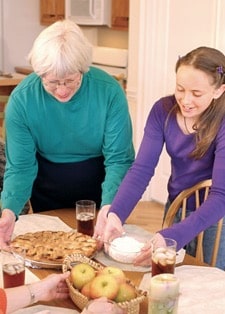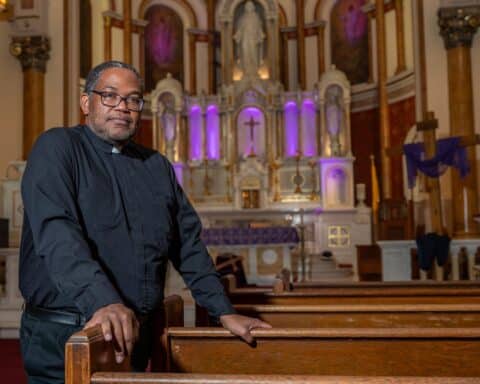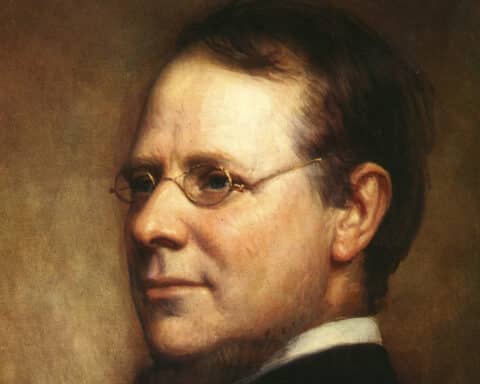The apostle James made it all seem so simple.
In his canonical epistle, he wrote: “Religion that is pure and undefiled before our God and Father is this: care for orphans and widows in their affliction and to keep oneself unstained from the world” (1:27).
Sounds pretty straightforward, right?
But it’s not. At least not necessarily. Just ask those in the Church charged with carrying out one of those tasks — ministering to the widowed — and they’ll tell you that honoring that command isn’t nearly as simple as it sounds. In fact, they’ll likely tell you that honoring it happens to be one of the Church’s more difficult pastoral challenges.
How can something that seems so simple be so hard?
Unchanging needs
Answering that question starts with understanding the needs of the widows and widowers themselves, the needs that the Church must strive to meet.
Two thousand years may have passed since St. James first endorsed caring for the widowed, but when it comes to the spiritual needs that such care is designed to meet, not much has changed. To start with, those who have lost their spouse still need help coping with grief.
“You haven’t just lost your spouse,” said Steve Smith, who lost his wife four years ago to a sudden illness and now helps lead a group for grieving spouses in the Diocese of Pittsburgh. “You’ve lost your future. What you thought was your future is gone. You’ve also lost your past. My wife was with me 40 years. There aren’t many people who’ve known me that long.”
Another constant is the fear many widows and widowers experience in those first weeks and months after the death.
For example, said Smith, there’s the fear of forgetting, of losing one’s memories of one’s spouse and dishonoring them in some way. There’s also the fear of being on one’s own, of having to relate to the world as a single person after years or decades of relating to it as part of a couple.
On top of that, widows and widowers still need help dealing with all the practical realities of life they now have to face without their spouse. For those widowed young, that can mean raising children, providing for a family or taking over a business. For others, it can mean suddenly having to assume “the jobs” of the other spouse — managing the finances, managing the meals, managing the maintenance — and those are often jobs for which the surviving spouse simply isn’t prepared.
“After four Christmases, I still don’t know where the Christmas stockings are,” Smith wryly confessed.
Throw in the exhaustion felt by those who have cared for their spouse through a long illness and the guilt those same widowers and widows often feel when relief is mixed in with grief, and it’s evident why St. James, for those reasons and more, placed such emphasis on the Christian community providing solace and care for its widowed members.
Postmodern loss
When St. James took down the Holy Spirit’s instructions, however, what he couldn’t know was how new needs would compound old needs in 21st-century America.
For example, whereas once upon a time the widowed had rituals for grieving and mourning, those rituals have been all but abandoned in the post-modern West. Black is now worn only at funerals. Mourning wreaths that once hung on families’ doors are rare. And it’s expected, not considered indecent, for a grieving spouse to socialize as soon as possible after the death.
The banishment of those exterior signs of mourning have deprived people of the small routines that once helped people navigate their grief. But, more importantly, said Kathleen Murphy, executive director of Beginning Experience, a Catholic grieving ministry for the divorced and widowed, their disappearance reflects contemporary culture’s desire to see those who grieve “move on, and move on fast.”
“People want you to get over it, to get out there and live life again as soon as possible,” she said. “But it’s not that simple. It takes quite a lengthy adjustment process.”
Pressure to “just get over it,” whether from friends, family, the culture or themselves, can cause grieving spouses to ignore their pain or slap a Band-Aid on it, Murphy said. But that never works in the long term, she added, because “the pain always resurfaces.”
That same desire can cause those close to the grieving spouse to forget just how long the grieving process lasts and neglect his or her emotional and spiritual, not to mention practical, needs.
“What you hear from the widowed people is that at first there’s a lot of support from the Church community, but after while, after a month or so, support diminishes,” Murphy said.
Accordingly, both those desires and the neglect that often ensues from them compound the struggles of the widowed. They feel more alone, more abandoned and unable to talk through their pain.
And those people, Smith pointed out, are the lucky ones, the ones who actually have close friends and family members to feel neglected by — which is another big change from St. James’ day.
“I talk to a lot of people who are alone,” Smith said. “They had fewer kids than their parents or grandparents did, and those kids aren’t local. Others relocated with their spouses right after retirement only to have their husband or wife die unexpectedly. So, they’re in a new town where they don’t know anybody. The sense of isolation is immense.”
Which, of course, makes the need for the Church’s ministry (as well as the task itself) all the greater.
Reaching out
The Church recognizes that. Which is why in any number of dioceses and parishes, despite budget cuts, vocations crises and volunteer shortages, some Catholics are at least trying to reach out to their widowed neighbors.
One of the most successful ways they’ve done this is through Beginning Experience.
Founded in 1974 by Sister Josephine Stewart and a divorced friend Ann Maria (Jo) Lamia, Beginning Experience is an international outreach to the separated, widowed and divorced that aims to help those who have lost a spouse through the grieving process. Currently operating in nine countries and 76 dioceses, Beginning Experience offers weekend retreats and evening meetings featuring presentations by those who have lost their spouse, as well as time for the newly grieving to talk and write about their loss, go to confession and hear Mass.
About six weeks after his wife died, Steve Smith was invited to attend a Beginning Experience retreat in Pittsburgh. For him, it was the first step in a long healing process.
“Everyone there knows what you’re going through,” he said. “That makes it a safe place where you can feel as bad as you need to feel.”
Like Pittsburgh, the Diocese of Wichita, Kan., also invited Beginning Experience into its diocese. There, along with the weekend retreats, program volunteers also conduct an eight-week Coping Through Loss Program, which meets on weekday evenings.
According to Kathy Hannemann, a volunteer who coordinates the program, the weekly meetings are a little “less intense” than the weekends, and offer those grieving a spouse time each week where they can socialize with others in similar situations as well as receive practical and spiritual advice from professional speakers. That advice includes dealing with loneliness and stress, adjusting to being single, dealing with changes in relationships and being in right relations with God and the Church.
Thirty years ago, the Archdiocese of St. Louis developed a similar program, although, according to Lee Schellert, who helped develop the program, there they maintained separate programs for the widowed and divorced in the initial stages of grieving. They then brought the two groups together in the later stages for socialization and fellowship, as well as ongoing education about the more practical problems that arise from losing a spouse, such as budgeting, financial planning and understanding the tax code.
That arrangement, Schellert said, worked well for a number of years, but in the late 1990s, budgetary constraints and an offer from a local funeral home to take on the work of running the grieving ministry led the diocese to shut down the part of the program that assisted widows and widowers through the initial stages of loss. Bereavement groups continue to exist on the parish level, as does the diocesan-wide fellowship and education program.
The Diocese of Peoria, Ill., has likewise chosen to develop its own program for widows and widowers. The diocese’s main outreach to widowed Catholics comes in the form of an advisory board, set up in 2007, that oversees how the Church in Peoria can better meet the needs of the divorced and widowed. According to Craig Dyke, who works in the diocese’s Office of Family Life and chairs the board, the advisers’ main focus is planning the events the diocese sponsors for divorced and widowed Catholics — an annual Mass, as well as a conference and day of reflection held alternately each year. The board also disseminates information on various parish support groups so that those who need more ongoing help can find something near them.
Limited reach
As those responsible for those various ministries and apostolates will tell you, to an extent, programs such as these are working. People are being reached and they’re being helped. But, again, they’re working only “to an extent.” What you’ll also hear from nearly everyone involved in ministry to the widowed is that they’re not reaching nearly the amount of people they want to reach or giving them nearly the amount of help they want to give.
Much of that, however, has little to do with the programs themselves. It’s more about the culture.
To start with, even where there is a good program in place (and there isn’t everywhere), reaching the people who most need to come and then convincing them to come poses a major challenge.
“I’m lucky if I can get a third of the people to whom I talk to come to the retreat,” Smith said.
Some of that he credits to difficulty spreading the word and marketing. He also credits some to “individualism.”
“Most people just want to tough it out,” he said. “There’s this idea that they should just be over it, that they shouldn’t need to come.”
Likewise, given people’s busy schedules, getting away for a whole weekend can be hard. So can finding the time (and these days, money) to travel weekly to a central diocesan event such as that in Wichita.
“Over the past couple of years, attendance has been declining at the Coping Experience nights, possibly due to the increasing number of grief groups at the parish and community level,” Hannemann said. “It’s simply cheaper and takes less time to go to a local parish.”
Which isn’t necessarily a bad thing. But the reason many dioceses became involved in widowed ministry in the first place, instead of just leaving the work to the parishes, is that it’s difficult for most parishes to maintain a bereavement group over any length of time.
“People tend to be very enthused at first,” Schellert said. “But within five years, that enthusiasm burns out, and they move on. They meet somebody and get remarried, or they get burned out because they and a handful of others have been doing the majority of the work. Then the group falls apart.”
That’s a problem, however, at both the parish and diocesan level. As a result of tight budgets and staffing cuts, most bereavement programs are staffed primarily by volunteers … who happen to be in short supply these days, regardless of the ministry.
“There’s a real shortage of people who want to get out there and volunteer to lead a group,” Dyke said. “Either they don’t think they can lead or they’re too busy with their own lives.”
Likewise, despite each bishop’s endorsement of the various outreaches, Pittsburgh’s, St. Louis’ and Wichita’s programs all operate without funding assistance from the diocese. They’re supported instead by donations, which is one reason why St. Louis eliminated its program for grieving widows and why Pittsburgh can’t add a series of weekly meetings to accompany its weekend retreats.
“We’d like to do more,” Smith said. “The need is immense. But the money, not to mention the volunteers, just aren’t there.”
Nor are they likely to be anytime soon. But, as Dyke pointed out, that doesn’t make the needs any less real, nor does it make Catholics’ obligation to try and meet those needs any less imperative.
“You can just see the hunger and need of these people,” he said. “They’re such an underprovided-for group in our Church, and we have to find a way to help. We can’t forget them.”
Emily Stimpson is an OSV contributing editor.
Sandy Richardson
Pittsburgh, Pa.
A year ago this April I lost my husband after a long battle with Alzheimer’s. He was in such terrible shape that at the end, I was actually praying for him to die. Once he did, for about two weeks, I felt extreme relief. Which sounds terrible, but there was no running to the hospital, no worrying, a great burden was lifted. Eventually the reality set in, however, and it was terrifying.
I tried several things to cope. First, I found a parish that had a grief meeting. The nun who led it kept telling me she knew what I was going through, but I had a hard time with that. “Unless you’ve lost your spouse,” I finally told her, “you don’t know what I’m going through. You might understand grief, but not mine.” I never went back. Then I tried another group. It was led by a man who did nothing but read from the Bible. That didn’t help, either. I felt like my life was over, my hope was gone, and I was angry at God. I needed something more.
Then I saw an ad in the bulletin for a Beginning Experience weekend. I was skeptical, but I signed up. I’m so glad I did. There, when someone said, “I know what you’re going through,” they really did know. Everyone had lost somebody — maybe only through divorce, but everyone had a hole in their heart where a loved one used to be. When the weekend was over, I wanted to stay. For the first time in a long time, I felt peace.
Since then, I’ve joined the New Catholic Friends group in the diocese. A lot of people come there from Beginning Experience. It’s been wonderful. I have friends from work who were supportive during the funeral, but maybe two weeks later, they were over it. When they asked, “How are you?” they expected me to say, “Fine.” So I learned to say, “Fine.” No matter how you feel, it’s what people want to hear. The people I’ve met through Beginning Experience, however, aren’t like that. When they ask, they really want to know. I’m so grateful for that. I just wish more people knew about it. People need to know there’s help. You can put it in the bulletins, but a personal invitation is better. Pastors should be inviting people to these weekends and spreading the word.
Deacon Andy Corder
Tucson, Ariz.
My wife died in 1990 from melanoma cancer. She was 30, I was 33, and we had three small kids. After her death, the physical support we received was fairly constant: We had family close by. Spiritually, however, it was much harder.
I think a Catholic support group would have helped, but the only one in the diocese at the time met during the day, when I was at work. There also was nothing for the kids.
She’d been a youth minister, however, so right after her death, a lot of priests and co-workers touched base with me to make sure things were going OK.
Of course, the more time that passed, the longer it went between visits. That was true of almost everyone, though.
Right after her death it was easy for people to ask, “How are you doing?” But after a few weeks, they didn’t want to ask that question anymore. I think they were afraid of setting me back.
There was one man, however, a deacon, who had checked up on my wife and me regularly during her illness. After her death he called or visited every couple of weeks for months. Talking things through with him helped tremendously. When you’ve lost someone, you need to find somebody you can trust to talk to. It doesn’t help to “man up” or pack the memories away.
After about five to six months, I started thinking clearly again, and eventually I remarried. But grief has its own timetable — you can’t rush it or ignore it — and, in some ways, it will always be with you.
If I had any advice to give pastors or friends of those grieving a spouse, I would urge them to listen to what the person is saying. Too often we get stuck on what we think we need to say and that prevents us from hearing where their grief is coming from.
Also, give them time. Don’t expect them to be back to normal in two weeks.
Finally, invite them to get involved at Church or serve in some way. Treating them like they’re still alive and still human, not some poor thing to be pitied, goes a long way.
What you can do
When St. James instructed the Christian faithful to care for orphans and widows, he wasn’t just addressing the ordained. He was addressing all Christians in all ages. Which means it’s every Christian’s responsibility to care for those grieving a spouse. So, how can you help those who have lost their husbands or wives?
1. Ask them how they’re doing and let them know you want a real answer, not just what they think you want to hear.
2. Don’t stop asking how they’re doing once the funeral is over.
3. When they tell you how they’re doing, listen and do so without feeling like you have to give the perfect advice. Just let them talk or cry and reassure them that you’re there whenever they want to talk again.
4. Check in regularly to see if there’s anything with which they need help, such as making sense of their taxes, mastering the art of meal planning or fixing something around the house.
5. Send your 12-year-old (or yourself) over to mow their lawn, rake the leaves or shovel snow.
6. Invite them over to your house for family dinners or special celebrations. And offer to give them a ride if they need one.
7. Invite or encourage them to get involved in the community or at Church in RCIA and CCD programs, or another ministry that could use their help.
Widows of Prayer
Two weeks after Carlotta Stricker’s husband died, she received a letter from the Widows of Prayer, an organization based near her home in Appleton, Wis. The letter informed her that the group would remember her husband at an upcoming Mass. Stricker had never heard of the Widows of Prayer, but she was so touched by their concern that she decided to attend the Mass. A year later, inspired by the witness of the women she met there, Stricker herself became a Widow of Prayer, making her first promises at a Mass last November.
The group itself was founded in 1994 by Mary Reardon. Reardon’s husband had died unexpectedly, and she wanted to find a way to dedicate her life to Christ. So, with the help of Capuchin Franciscan Father John Guimond, a priest from the Monte Alverno Retreat Center where she’d once worked, she established the Widows of Prayer, a canonically approved association of the faithful whose members are bound by solemn promises to the work of interceding for the Church’s seminarians, priests, and bishops.
To join, candidates complete a year of formation, then make temporary promises in which they commit to a regular prayer life, consisting typically of daily Mass, the recitation of the Rosary, an hour of Eucharistic adoration and additional mental prayer. A year later, they renew those promises, and in the third year, they’re invited to make the promises final. There are 60 living members and 19 deceased, as well as 22 candidates. They have chapters consisting of three or more members in six dioceses and individual members in several more.
For all the women, participation in the apostolate is their way of contributing to God’s work in the world.
“Without our priests we wouldn’t have Jesus in the Eucharist, and given the shortage of priests, it just seems right for widows who have the time to give their lives to God for his priests,” Reardon said.
“With all the turmoil in the world and with all the families in trouble needing the witness of good priests, there’s such a need for this kind of prayer,” added Stricker. “Finding the Widows of Prayer and becoming part of their amazing work got me through this past year. I feel like I’m honoring my husband and serving God at the same time.”
Resources
Websites
Beginning Experience: www.beginningexperience.com
Widows of Prayer: www.widowsofprayer.org
Books
“Walk With Me, Jesus: A Widow’s Journey,” by Ronda Chervin (Peter Simon Press, $16.99)
“Grant Us Peace: Rosary Meditations for Those Who Mourn,” by Beth Mahony (Ave Maria Press, $4.95)
“Grieving with the Help of Your Catholic Faith,” by Lorene Hanley Duquin (OSV, $5.95)
“Gentle Keeping: Prayers and Services for Remembering Departed Loved Ones Throughout the Year,” by Sister Mauryeen O’Brien (Ave Maria Press, $7.95)
Changing Demographics
With fertility rates declining and life expectancy rising, many of today’s widowed Catholics face a longer future alone without the comfort or help of children.*
14.4 million: The number of widows and widowers in America today
7: The most common U.S. household size in 1900
2: The most common U.S. household size in 2000
3.56: The average fertility rate in 1900
1.77: The average fertility rate in 1980
2.05: The average fertility rate in 2000
51: Average life expectancy in 1900
69: Average life expectancy in 1950
77: Average life expectancy in 2000
*Based on data from the U.S. Census Bureau





